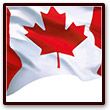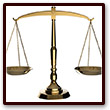Stuck in the middle: The state of online casino legislation in Canada
 For Canadians, defining our identity has always been a struggle. We're not American - though when we travel abroad, the locals assume we bleed red, white, and blue until they see the maple leaf on our backpack. And though no one would confuse us for being British, because we do have the Queen on our money. Plus, we share a sense of humour that's more in line with what they find funny across the pond than what they laugh at south of the 49th parallel.
For Canadians, defining our identity has always been a struggle. We're not American - though when we travel abroad, the locals assume we bleed red, white, and blue until they see the maple leaf on our backpack. And though no one would confuse us for being British, because we do have the Queen on our money. Plus, we share a sense of humour that's more in line with what they find funny across the pond than what they laugh at south of the 49th parallel.
It's fair to say that we're sort of caught somewhere in the middle. And that's not just an assessment of our national identity. It's also an assessment of the current state of online gambling in Canada.
South of the border, the government wants to shut down online gambling. Some argue for moral reasons, though the reality seems to be so that they can run the show and take 100% of the multi-billion-dollar pie. In 2006, our American friends tacked a provision onto an anti-terrorism bill that made it illegal to process credit card transactions related to online gaming. They did so in an effort to cripple all the offshore online casinos and poker sites operating from Costa Rica, Malta, Antigua, and elsewhere. The US also has the 1961 Wire Act on its side, though it was recently ruled that the act doesn't apply to online poker.
While our American friends think that crippling the online casino competition so that they can get in the driver's seat is the right direction, our friends across the pond have taken a completely different approach.
In 2005, the British Parliament passed a Gambling Act that allows online gambling websites to run from within the country. Those who do are taxed, and they operate within the law, so they're fully regulated.
So, that's a regulation and taxation approach for the UK. And a shoot first and ask questions later approach for the US.
And, just like our national identity, Canada is somewhere in the middle, still difficult to peg. Why the online gambling identity crisis? Well, it's a cross between a murky criminal code, a sovereign nation that no one wants to touch, and a government that's taking a wait and see approach.
The Criminal Code
 Prior to 1969, you couldn't bet on anything in Canada other than horse races, charity lotteries, and lotteries that you might find at fairs. But that year, the federal government changed the criminal code to allow the federal government and the 10 provinces to hold lotteries.
Prior to 1969, you couldn't bet on anything in Canada other than horse races, charity lotteries, and lotteries that you might find at fairs. But that year, the federal government changed the criminal code to allow the federal government and the 10 provinces to hold lotteries.
In 1985, the federal government decided to hand off all gambling to the provinces. But the criminal code didn't actually change in terms of what people can and can't gamble on.
Here are the facts. The Criminal Code of Canada says it's illegal to run a betting house or to be found in one. But it doesn't make any mention of an online betting house, so it's not clear whether Canadian online casinos and poker sites fall under the code.
The Criminal Code says that the provinces may run different forms of gambling, including something called lottery schemes. Section 207 actually mentions that lottery schemes include lotteries operated on through a computer. That's led a few provinces getting in on the action.
In 2012, British Columbia launched the first regulated and fully legal casino in North America. The PlayNow site offers Internet casino games and a virtual poker room to anyone over the legal gambling age who wants to play. However, its virtual casino doors are only open to residents of British Columbia.
So where does everyone else play? Most likely at many of the other thousands of online casinos operating from "offshore".
The Sovereign Nation
 Why did we put offshore in quotes? Well, offshore often evokes connotations of outside the country, perhaps in the Caribbean or somewhere exotic. Some sites operate from Antigua and Costa Rica, so there's some truth to that exoticism, but a lot of that is smoke and mirrors.
Why did we put offshore in quotes? Well, offshore often evokes connotations of outside the country, perhaps in the Caribbean or somewhere exotic. Some sites operate from Antigua and Costa Rica, so there's some truth to that exoticism, but a lot of that is smoke and mirrors.
While the online gambling offices are located offshore, a majority of the servers for some of the world's most reputable online casinos are actually based right here at home in Canada.
Just outside of Montreal sits a native reserve called Kahnawake Mohawk Nation. In 1996, they established the Kahnawake Gaming Commission, offering gaming licenses to online casinos that qualify.
They're also a host to countless servers for hundreds of Internet gambling sites that serve gamblers all over the world - including those in Canada.
The Mohawk Nation argues that they are their own sovereign nation, and therefore they have the right to operate casinos.
Now here's where it gets tricky. The Kahnawake Mohawk Nation can essentially run a casino or at least lease space to all sorts of other online casinos from within Canadian borders and not be prosecuted. But private enterprises like horserace companies who operate legally within Canada are forbidden from operating online casinos or poker sites under the Criminal Code of Canada. But that's not to say no one hasn't tried.
In 1995, a company called Starnet Communications was created in Vancouver with the goal of developing, licensing, and providing Internet gambling technology and websites for casinos and sportsbooks. Because of the sketchy Criminal Code, the company set up offshore companies to carry out operations of the site. But the RCMP wasn't impressed. IN 1999, they raided the Vancouver offices, arguing that because the email servers were located in Canada, they were in violation of the criminal code even though the gaming servers were located offshore.
Legal Canadian Casinos
 That's not to say that every company operating from Canada since 1999 has been in violation of the law.
That's not to say that every company operating from Canada since 1999 has been in violation of the law.
Cryptologic, a major manufacturer of online gambling software, had operated legally from Canada. And Excapsa Software, an online software company for popular Internet poker site UltimateBet, was also based in Toronto.
But neither of these companies actually carried out online casino operations. They simply manufactured the software that poker and casino players used to access the games, which were run virtually from an offshore server or Kahnawake.
Unfortunately, both of these companies were booted out of Canada - and not by the RCMP or the Canadian federal government. No, instead, these online gambling companies were a victim of the US policy on online gambling.
And Canadians? Well, they continued to gamble at online casinos located "offshore" because nothing really changed - at least in their minds. The sites they loved remained open. And no one really cared whether the company offering horseracing wasn't allowed to offer casino games. The bottom line was that many companies were offering casino games and a good chunk of them had solid reputations, so who really cares?
The Wait and See Approach
 So what's next for Canada? No one really knows. Canadians love to gamble online, and they're not prosecuted for doing so. Money is pumped into the Canadian economy through advertising. And it could be argued that Canadian online casinos aren't taking away businesses from land-based casinos but instead fuelling interest in the bricks-and-mortar sites.
So what's next for Canada? No one really knows. Canadians love to gamble online, and they're not prosecuted for doing so. Money is pumped into the Canadian economy through advertising. And it could be argued that Canadian online casinos aren't taking away businesses from land-based casinos but instead fuelling interest in the bricks-and-mortar sites.
Canada could tighten online gambling laws, essentially ushering in an era of prohibition, but that's not very likely. If it did usher in an outright ban online gambling, the Kahnawake Mohawk Nation would argue, once again, that the prohibition doesn't affect them, so it would be back to the drawing board anyway.
What's more likely is that the laws become more liberal with a clarification of the Criminal Code that permits online gambling. Unfortunately, if the government were to welcome competition with open arms, the provincial governments would be, well, up in arms since they have the exclusive legal right to run online casinos.
So, much like our identity, we're not sure where we stand on online gambling in Canada. With so many ifs, it's hard to know what online gambling legislative future to bet on.
But while it might be tough to operate an online casino from Canada, finding a legal Canadian online casino to play at, which ironically might be located in Canada, isn't difficult at all. We have tons of reputable choices, both in terms of provincially run options and internationally regulated sites. And we're willing to bet that it will stay that way for a long, long time.
- Real Money
- Best Bonuses
- Legal
- Canadian Dollars
- No Download Sites
- Gambling in Canada
- New Casinos
- Microgaming Sites

